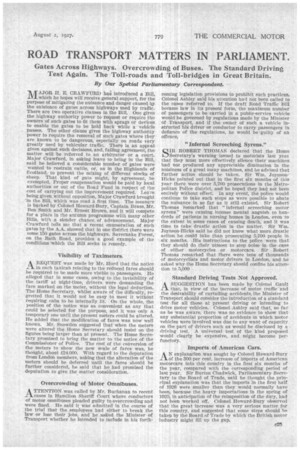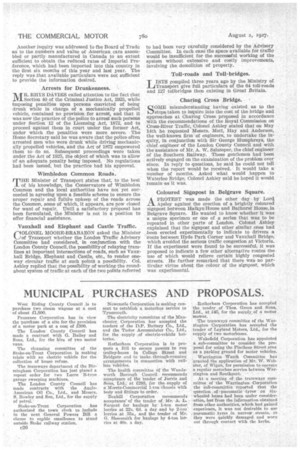ROAD TRANSPORT MATTERS IN PARLIAMENT.
Page 47

Page 48

If you've noticed an error in this article please click here to report it so we can fix it.
Gates Across Highways. Overcrowding of Buses. The Standard Driving Test Again. The Toll-roads and Toll-bridges in Great Britain.
By Our Spetial Parliamentary Correspondent.
MAJOR H. E. CRAWFURD hag introduced a Bill, which he hopes will receive general support, for the purpose of mitigating the nuisance and danger caused lay the existence of gates across highways used by traffic. There are two operative clauses in the Bill. One gives the highway authority power to request or require the owners of such gates to fit them with sprags or devices to enable the gates to be held back while a vehicle passes. The other clause gives the highway authority power to require the removal of such gates where they are known to be dangerous, especially on roads very greatly used by vehicular traffic. There is an appeal given against such decisions, and, failing agreement, the matter will be referred to an arbitrator or a court. Major Crawfurd, in asking leave to bring in the Bin, said he believed a considerable number of gates were wanted to restrain cattle, or, as in the Highlands of Scotland, to prevent the mixing of different stocks of sheep. That kind of gate might, by agreement, be exempted. Proper compensation would be paid by local authorities or out of the Road Fund in respect of 1 he cost of carrying out the improvement required. Leave being given without opposition, Major Crawford brought in the Bill, which was read a first time. The measure is backed by Colonel Howard-Bury, Captain Brass, Mr. Ben Smith and Mr. Ernest Brown, and it will compete for a place in the autumn programme with many other Bills, with a slender chance of advancement. Major Crawfurd tells me that a recent enumeration of such gates by the A.A. showed that in one district there were some 150 gates across the highways. Savernake Forest, on the Bath Road, provides a good example of the conditions which the Bill seeks to remedy.
Visibility of Taximeters.
A REQUEST was made by Mr. Hurd that the notice _CI in each taxicab relating to the reduced fares should be required to be made more visible to passengers. He alleged that in some cases, owing to the invisibility of the tariff at night-time, drivers were demanding the fare marked on the meter, without the legal deduction. The Home Secretary, whilst aware of the difficulty, regretted that it would not be easy to meet it without requiring cabs to be internally lit. On the whole, the position of the notice was as convenient as any that could be selected for the purpose, and it was only a temporary one until the present meters could he altered. Ile added that the modification of fares was now well known. Mr. Snowden suggested that when the meters were altered the Home Secretary should insist on the figures being larger than at present. The Home Secretary promised to bring the matter to the notice of the Commissioner of Police. The cost of the conversion of the meters to show the new scale of fares was, he thought, about 124.000. With regard to the deputation from London members, asking that the alteration of the meters should be deferred until the fares should be further considered, he said that he had promised the deputation to give the matter consideration.
Overcrowding of Motor Omnibuses.
A TTENTION was called by Mr. Buchanan to recent .tILcases in Hamilton Sheriff Court where conductors of motor omnibuses pleaded guilty to overcrowding and were fined. He said it was admitted in the course of the trial that the employees had either to break the law or lose their jobs, and he asked the Minister of Transport whether he intended to include in his forth
coming legislation provisions to prohibit such practices. Colonel Ashley said his attention had not been called to the cases referred to. If the draft Road Traffic Bill became law in its present form, the maximum number of passengers to be carried in a public-service vehicle would be governed by regulations made by the Minister of Transport, and if the owner of such a vehicle instructed his driver or conductor to carry passengers in defiance of the regulations, he would be guilty of an offence,
"Infernal Screeching Syrens."
SIR ROBERT THOMAS declared that the Home Secretary's warning issued to motorists last year that they must more effectively silence their machines had not produced any appreciable diminution in the noisiness of a great many machines, and he advised that further action should be taken. Sir Wm. JoynsouHicks pointed out that in the first six months of this year there were over 5,700 prosecutions in the Metropolitan Police district, and he hoped they had not been entirely without effect. In any event, the police would continue to take such steps as were possible to abate the nuisance in so far as it still existed. Sir Robert Thomas remarked that "infernal screeching motor syrens" were causing intense mental anguish to hundreds of patients in nursing homes in London, even to the extent in some cases of causing death, and it was time to take drastic action in the matter. Sir Wm. Joynson-Hicks said he did not know what more drastic action he could take than prosecuting 5,700 people in six months. His instructions to the police were that they should do their utmost to stop noise in the case of either motorcycles or motorcars. Sir Robert Thomas remarked that there were tens of thousands of motorcyclists and motor drivers in London, and he asked why the Home Secretary should confine his attention to 5,000 Standard Driving Tests Not Approved.
ASUGGESTION has been made by Colonel Gault that, in view of the increase of motor traffic and the desirability of curtailing accidents, the Minister of Transport should consider the introduction of a standard test for all those at present driving or intending to drive motor vehicles. Colonel Ashley said that, so far as he was aware, there was no evidence to show that any substantial proportion of accidents in which motor vehicles were involved was due to any want of capacity on the part of drivers such as would be disclosed by a driving test. A universal test of the kind proposed would clearly be expensive, and might become perfunctory.
Imports of American Cars. AN explanation was sought by Colonel Howard-Bury of the 300 per cent, increase of imports of American motorcars into this country in the first six months of the year, compared with the corresponding period of last year. Sir Burton Chadwick, Parliamentary Secretary to the Board of Trade, said he thought the principal explanation was that the imports in the first half of 1926 were smaller than they would normally have been, because the heavy importations In the spring of 1925, in anticipation of the reimposition of the duty, had not been worked off. Colonel Howard-Bury observed that the great increase was a very serious matter for this country, and suggested that some steps should he taken by the Board of Trade by which the British motor industry might fill up the gap.
Another inquiry was addressed to the Board of Trade aS to the numbers and value of American cars assembled or partly manufactured in Canada to an extent sufficient to obtain the reduced rates of Imperial Preference, which had been imported into this country in the first six months of this year and last year. The reply was that available particulars were not sufficient to provide the information desired.
Arrests for Drunkenness.
R. RBA'S DAVIES called attention to the fact that
Section 40 of the Criminal Justice Act, 1925, while Imposing penalties upon persons cionvicted of being drunk while in charge of a mechanically propelled vehicle, contained no provision for arrett, and that it was now the practice of the police to arrest such persons under Section 12 of the Licensing Act, 1872, and to proceed against them in court under the former Act, under which the penalties were more severe. The Home Secretary said he was aware that the police often arrested men who were drunk while driving mechanically propelled vehicles, and the Act of 1872 empowered them to do so. Subsequent proceedings were taken ender the Act of 1925, the object of which was to allow Of an adequate penalty being imposed. No regulations had been issued, but the practice had his approval.
Wimbledon Common Roads.
THE Minister of Transport states that, to the best of his knowledge, the Conservators of Wimbledon Common and the local authorities have not yet succeeded in agreeing upon a feasible scheme to ensure the proper repair and futtfre upkeep of the roads across the Common, some of which, it appears, are now closed for want of repair. Until a satisfactory proposal has been formulated, the Minister is not in a position to offer financial assistance.
Vauxhall and Elephant and Castle Traffic.
eiOLONEL 14100RE-BRABAZON asked the Minister of Tranoport whether the London Traffic Advisory Committee had considered, in conjunction with the London County Council, the possibility of relaying tramlines at important intersections of roads, such as Vauxhall Bridge, Elephant and Castle, etc., to render oneway circular traffic at such point t a possibility. Col. Ashley replied that the possibility of working the roundabout system of traffic at each of the two points referred to had been very carefully considered by the Advisory Committee. In each case the space available for traffic would be insufficient for the successful working of the system without extensive and costly improvements, involving the demolition of property.
Toll-roads and Toll-bridges.
T4ISTS compiled three years ago by the .Ministry of 1 TranspOrt give full particulars of the 64 toll-roads and 127 tollbriclges then existing in Great Britain.
Charing Cross Bridge.
SOME misunderstanding having existed, as to the steps taken to inquire into the cost of the bridge and approaches at Charing Cross proposed in accordance with the recommendations of the Royal Commission on Cross-River Traffic, Colonel Ashley stated that on May 14th he requested Messrs. Mott, Hay and Anderson, the well-known firm of engineers, to undertake the inquiry, in conjunction with Sir George Humphreys, the chief engineer of the London County Council and with the assistance of Mr. A. W. Szlumper, the chief engineer of the Southern Railway. These gentlemen bad been actively engaged on the examination of the problem ever since. In reply to questions, he said he could not tell when the report would be received. It would take a number of months. Asked what would happen to Waterloo Bridge, Colonel Ashley said he hoped it would remain as it was.
Coloured Signpost in Belgrave Square.
A PROTEST was made the other day by Lon],
Apsley against the erection of a brightly coloured signpost between Halkyn House and Bathurst House, in Belgrave Square. He wanted to know whether it was a unique specimen or one of a series that was to be repeated in other parts of London. Colonel Ashley explained that the signpost and other similar ones had been erected experimentally to indicate to drivers a route between Hyde Park Corner and Vauxhall Bridge, which avoided the serious traffic congestion at Victoria. If the experiment were found to be successful, it was proposed to indicate a few other alternative routes the use of which would relieve certain highly congested streets. He further remarked that there was no particular virtue about the colour of the signpost, which was experimental.












































































































